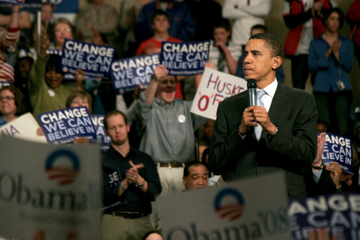 – the first a Ronald Reagan Republican who helped turn Tarrant County into one of the most entrenched GOP strongholds in the state, the second a Democrat (and peace activist, no less) who has managed the feat of hanging onto his seat in the Texas Legislature for 12 years despite the Republican dominance.
– the first a Ronald Reagan Republican who helped turn Tarrant County into one of the most entrenched GOP strongholds in the state, the second a Democrat (and peace activist, no less) who has managed the feat of hanging onto his seat in the Texas Legislature for 12 years despite the Republican dominance.
But here’s where the two long-time political opponents agree: This year’s Texas Democratic primary, coming up in about three weeks, not only has a chance of making a real difference in presidential politics for once, but there’s reason to think that it could also signal the biggest turnout in local and Texas politics since the Reagan years. Usually by the time the presidential primary circus reaches Texas, it’s greeted with a large yawn, because the major-party nominees for president have already been decided by voters in states with earlier primaries. Last spring, legislators, in fact, tried to add Texas to the two dozen or so states voting on Feb. 4 as part of Super Tuesday, but Republicans in the Texas Senate killed the attempt.
Now that spoil-sport move looks like brilliance. Super Tuesday has come and gone, and the race for the Democratic presidential nomination, at least, is still a dead heat. As a result, the political communities in these parts have reached a level of excitement not seen in two decades. Why? Not only will Texas for once be a real player in the grueling climb to the White House – even, perhaps, on the Republican side – but it will play that role in a historic year, with an African-American and a woman the only choices on the Democratic ballot.
And there’s an aspect of the buzz that goes beyond those explanations. The fact that one of the candidates is named Barack Obama, it seems, is a factor all its own. Experts in both parties believe that his presence on the primary ballot is bringing new voters and new money into the system in record numbers. Obama’s oratory, Hollern said, is “the best since Barbara Jordan,” and it’s energizing the young and politically disaffected to register, vote, spend money, and even get involved personally in campaigns. “That’s a good thing,” he said. “It’s just not good for Republicans.”
The upswing in interest in the Democratic primary may or may not translate to Democratic victories locally or nationally in the general election, given the intricate political equations involved. But in the meantime, the candidates bearing down on Texas – with entourages and media in tow – have been preparing the ground for months, using all the new campaign strategies of grassroots organizing, internet fund-raising, and the like. Even a clear front-runner like John McCain is expected to beat the bricks here, not because he needs the delegates to get the nomination, but to increase the chances that Texas’ conservative Republicans will turn out in November to vote for him – perhaps while holding their noses. And former Arkansas Gov. Mike Huckabee, who took his master’s degree from Fort Worth’s own Southwestern Baptist Theological Seminary, says he will keep campaigning despite McCain’s near lock on his party’s nomination, to give conservative Republicans an alternative.
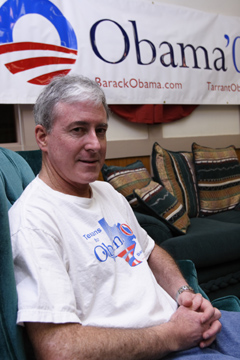 In general, Republicans are glum about the primary because McCain ruffles the feathers of the party faithful here. Which could mean, of course, that plenty of Republicans will cross the aisle to vote in the Democratic primary this year.
In general, Republicans are glum about the primary because McCain ruffles the feathers of the party faithful here. Which could mean, of course, that plenty of Republicans will cross the aisle to vote in the Democratic primary this year.
State Sen. Kirk Watson of Austin, a longtime Democratic player at local, state, and party levels, said that across the spectrum, the intensity of interest “is one I haven’t seen in my political lifetime.” The real question for Texas Democrats may be what happens after March 4 – and whether enthusiasm now will translate to votes in November and a boost for their party’s revival in this state.
Texas will send 228 delegates to Denver in late August to take part in the Democratic National Convention, including 126 allocated according to results of the primary. It’s not the biggest single pot of delegates left for the candidates to wrangle over, but combined with the three other states with primaries on March 4, it’s the largest one-day vote left before the conventions. But if some observers were surprised to find out, post-Super Tuesday, that there’s still a hot race for the Democratic nomination, that doesn’t mean the candidates were caught flat-footed. Both Democratic front-runners – U.S. Sens. Barack Obama of Illinois and Hillary Clinton of New York – in varying degrees, have been planning their strategy here for a while.
“Obama supporters here are ahead of Hillary’s in organization since she banked on a Super-Tuesday knockout, and now she’s scrambling to get money to come into Texas,” said Fort Worth’s Eddie Griffin, an ex-Black Panther who served time in prison and now mentors young black men, helps men and women coming out of prison, writes a political blog, registers voters, speaks on college campuses – and counts himself as a political independent. Obama’s campaign “has been well-organized here for more than a year,” said Tarrant County Commissioner Roy Brooks. “The national campaign people [for Obama] parachuted in here early Wednesday morning after Super Tuesday, and we were ready for them.”
Mark Greene, a Democrat who ran unsuccessfully against U.S. Rep. Kay Granger of Fort Worth, is a spokesman for the Obama campaign. He countered any notion that they would have to scramble to be ready for the March 4 primary and echoed Brooks’ optimism about the impact it can have. “We’ve been organizing for more than a year, here and across the state, and we have a huge cadre of volunteers who have already hit the ground running,” he said. Obama volunteers met in Austin last summer, Greene said, and have stayed in close contact. “We knew, when we began to see how close it was getting [between Obama and Clinton], that Texas would be in play.”
They plan to set up 10 offices in Texas – including the Fort Worth office, opened with fanfare on Tuesday night, and to bring in at least 100 workers, including several either from Texas or with experience in the state, in addition to those already on the ground here. Obama supporters credited Fort Worth native Trista Allen with Obama’s large victories in southern states and said she can do the same for Texas. Allen is Obama’s southern field director, and Burnam and other Democrats said her high-profile role in the campaign will increase his chances of winning the county and the state.
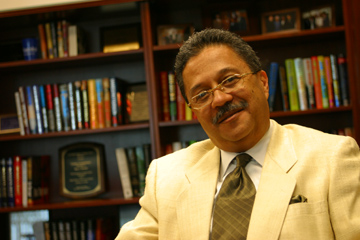 Allen is well known in Texas political circles. She started her political career keeping books for the Tarrant County Democratic Party in 1998 when she was a student at Texas Wesleyan University. After graduation, she worked for the state Democratic Party, was political director for Chris Bell’s unsuccessful bid for Texas governor, crisscrossed New Mexico as a coordinator for the John Kerry presidential campaign, worked on the staff of the Reproduction Rights Caucus and most recently was a spokesperson for Dallas District Attorney Craig Watkins. “She’s one of the best political organizers I’ve ever seen,” Burnam said. “She’ll be in the White House if Obama wins the presidency.”
Allen is well known in Texas political circles. She started her political career keeping books for the Tarrant County Democratic Party in 1998 when she was a student at Texas Wesleyan University. After graduation, she worked for the state Democratic Party, was political director for Chris Bell’s unsuccessful bid for Texas governor, crisscrossed New Mexico as a coordinator for the John Kerry presidential campaign, worked on the staff of the Reproduction Rights Caucus and most recently was a spokesperson for Dallas District Attorney Craig Watkins. “She’s one of the best political organizers I’ve ever seen,” Burnam said. “She’ll be in the White House if Obama wins the presidency.”
Clinton may have counted on having the nomination wrapped up by this time, but that doesn’t mean she’s without veteran troops in Texas. Because Hillary and Bill Clinton have been involved in national politics for so long, they have lots of personal and political friends here who are already working for them. Longtime Clinton buddies like former Land Commissioner Garry Mauro and GSD&M advertising honcho Roy Spence have been friends of and organizers for the Clintons since way back in 1972 when they all worked on George McGovern’s presidential campaign. Spence has a worldwide reputation as an adman, and Mauro has run for statewide office five times, including once for governor. The pair know people in every part of the state.
Mauro, who is chairman of Clinton’s Texas campaign, said the effort in the Lone Star State is expanding rapidly. “We’re in the process of opening 12 offices and moving 100 people onto the payroll, including 60 to 70 from out of state,” he said. “We’re working on early voting, which starts Feb. 19.” People tend to forget, he said, that 40 percent of Texas’ Democratic delegates will be elected by caucuses. “So we’re gearing up for over 12,000 precinct conventions in 8,000 locations,” he said. “Obama does pretty good at organizing caucuses, so we’ve got to work really hard at making sure we don’t just win the primary [popular vote] and still not get any more delegates than he does.” Obama’s ads started Monday and Clinton’s on Tuesday. “We’re way, way ahead on endorsements,” Mauro said. “But since this is for president, endorsements mean less.” Clinton’s plan was to hit Texas on Tuesday, as soon as the “Potomac Primary” (Maryland, Virginia, and Washington, D.C.) was over. Husband Bill will follow later in the week. As for the Clinton campaign infrastructure, Mauro said, “We have had a Team Hillary organization on the internet and a more traditional organization going on for the last year.”
The internet is the single most important reason that both of the Democratic camps say they were ready to move quickly when Super Tuesday’s results showed that Texas would be a key player. It’s allowed campaigns to find and keep in touch with their supporters more quickly, economically, and efficiently than ever before. It is helping both Obama and Clinton to energize and communicate with literally thousands of volunteers. Obama’s team, for instance, fielded 175,000 volunteers on Super Tuesday. In Fort Worth, Griffin spreads the word for Obama via his blog and through almost daily e-mails to his extensive network of politicos, preachers, professors, students, and community activists.
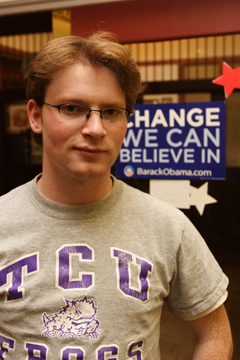 The internet has also proved to be a huge fund-raising tool, as Howard Dean demonstrated in 2004 and John Kerry accelerated later that year. In 2008, Obama has turned it into a monstrously helpful way to economically get smaller donors to participate. He raised a stunning $32 million from 170,000 donors in January alone. Libertarian-leaning Republican Ron Paul of Texas has used the web to raise unprecedented amounts for a relative unknown (though he’s backing off his presidential campaign this week to make sure he gets nominated for re-election to his Gulf Coast Congressional seat). If the McCain-haters stay home on March 4, Paul’s true believers here could give him and Huckabee both a boost, albeit toward an almost impossible goal of overtaking McCain.
The internet has also proved to be a huge fund-raising tool, as Howard Dean demonstrated in 2004 and John Kerry accelerated later that year. In 2008, Obama has turned it into a monstrously helpful way to economically get smaller donors to participate. He raised a stunning $32 million from 170,000 donors in January alone. Libertarian-leaning Republican Ron Paul of Texas has used the web to raise unprecedented amounts for a relative unknown (though he’s backing off his presidential campaign this week to make sure he gets nominated for re-election to his Gulf Coast Congressional seat). If the McCain-haters stay home on March 4, Paul’s true believers here could give him and Huckabee both a boost, albeit toward an almost impossible goal of overtaking McCain.
Huckabee’s Tarrant County campaign chairman Ben Deckert said online connections “are at the heart of this campaign.” His candidate has a “big following” here, Deckert said, although the local group has only about 150 members. The bulk of his support comes from those who show up only in cyberspace, he said, not at meetings. “Online connections are the heart of this campaign,” Deckert said. Huckabee supporters get together in a “meeting room” on the internet called Meetup.com. Deckert said the site has been used extensively by local supporters of the former preacher as an organizing and strategy-sharing tool. And then there’s HucksArmy.com, which is the campaign’s web site. “Millions of viewers are getting together there and pledging money,” Deckert said. “It’s a new kind of grassroots effort, one we’ve never had before.”
Not surprisingly, a major portion of those who’ve been recruited via the web are young – part of a potentially powerful voting bloc for anyone who can overcome the typical Generation-Y disinterest in politics. (After all, the biggest Democratic primary turnout in Texas history – almost 2.2 million – came in 1972, when the draft and the mounting opposition to the Vietnam War were major factors in bringing political activism to American campuses with a vengeance.) Lance Webb, a TCU political science major and Fort Worth native, is one who gives Obama – and the current war – credit for getting young voters interested again. The 21-year-old is the head of Students for Obama on the TCU campus, and he said he’s working eight hours a day on the campaign and still making it to his classes. “In our grassroots organizing, we’ve found a lot of deep commitment [among students] to Barack,” he said.
Webb has heard Obama speak twice to enthusiastic crowds in Austin. The war in Iraq is a motivating force, he said. “Barack’s been right on that from the beginning. … No matter what we were told about the need for this war, it has turned into a business war, a war for profit, and the cost is being paid by those who will never profit from it, by kids I graduated from high school with who had few choices other than the military.” Webb spent his Christmas break in New Hampshire with kids from all over the country, working for Obama. “Some had taken a year off from school to work in his campaign,” Webb said. “I can’t imagine anyone driving more than 10 miles [to work in a campaign] before Barack.”
Melanie Harris, like Webb, thinks young voters will turn out in record numbers on March 4, but not all to vote for Obama. Harris, 22, is for Clinton “all the way,” she said. She graduated from TCU in December with degrees in political science and Spanish and plans to work as a Clinton volunteer until after the March primary, when she’ll move to Washington, D.C., to start her new job at the Justice Department. She was planning to hit the sidewalks for her candidate this week, when the Clinton campaign opens its headquarters near the law office of Democratic County Chairman Art Brender, a long-time supporter of the Clintons. “I’ve been a Hillary supporter since nearly the beginning,” Harris said. “I am not voting for her because she’s a woman, I’m voting for her because she’s the best candidate for these times.” She said she favors Clinton because of her healthcare policy, her ability to work with those across the aisle, and her experience in the Senate, the White House, and the governor’s mansion in Arkansas.
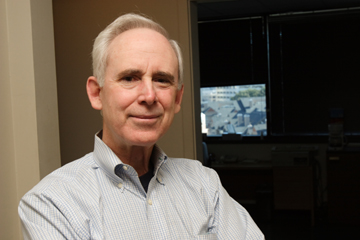 Harris said she’s been surprised and encouraged by the reaction of the traditionally conservative TCU students to the Clinton and Obama campaigns. “There was enthusiasm for her there and for Barack as well,” she said. “This election is so important to a lot of students. … They are paying attention and getting involved in the political process.” For Democrats, the key to turning all these new voters into long-term assets may depend a lot on who gets their party’s nomination. Obama supporters say – and many others privately agree – that many of the enthusiastic young people he has brought into the process are also idealistic and that if he doesn’t end up on the ticket, they will see it as politics as usual and not vote. That effect could be especially bad if the party’s so-called “super-delegates” – party officials and officeholders who aren’t bound by primary results – shift the balance in a close call at the national convention to take the nomination away from Obama.
Harris said she’s been surprised and encouraged by the reaction of the traditionally conservative TCU students to the Clinton and Obama campaigns. “There was enthusiasm for her there and for Barack as well,” she said. “This election is so important to a lot of students. … They are paying attention and getting involved in the political process.” For Democrats, the key to turning all these new voters into long-term assets may depend a lot on who gets their party’s nomination. Obama supporters say – and many others privately agree – that many of the enthusiastic young people he has brought into the process are also idealistic and that if he doesn’t end up on the ticket, they will see it as politics as usual and not vote. That effect could be especially bad if the party’s so-called “super-delegates” – party officials and officeholders who aren’t bound by primary results – shift the balance in a close call at the national convention to take the nomination away from Obama.
But another Roy Brooks from Fort Worth – Roy LaVerne Brooks, vice-chairwoman of the Texas Democratic Party, is one of the super-delegates who plans to hear the will of the people before committing her vote. “For me, being black and female, both candidates are awesome, both historic,” she said. “But right now my job is to get the party organized across the state and get out the vote.” In Texas, there’s another demographic that’s getting at least as much attention from the campaigns, and that’s Hispanic voters, who represent a clear majority in many Texas precincts. In Tarrant County, about 30 percent of the population is Hispanic. Clinton is expected to do well with Hispanics partly because of her husband’s lingering popularity with that group. But Obama supporters say they’re not convinced Clinton will carry the Hispanic vote in the primary. Locally and statewide, high-profile Hispanics are split between the two Democratic front-runners.
Fort Worth City Council member Sal Espino and Fort Worth schools trustee Camille Rodriguez are supporting Obama, while long-time party stalwart and Tarrant County constable Sergio De Leon is solidly behind Clinton. Burnam, whose district is predominantly Hispanic and blue-collar, said the Latino community here is divided almost evenly. State Rep. Rafael Anchia of Dallas rejected the argument that most Latinos will not vote for an African-American for president. “General Patton once said that 80 percent of leadership is improving morale,” Anchia said. “And right now the country is in a pretty demoralized state and looking to get out of it, and I think Sen. Obama has the most compelling message there.”
Online balloting has even become a way to gauge a candidate’s support among union members. In right-to-work Texas, unions haven’t recently been considered a powerful voting bloc, though in some areas, such as the Gulf Coast, they are still good at getting out the vote. Clinton supporters in Fort Worth said they think union support is going to help their candidate carry Tarrant County – and other parts of North Texas.
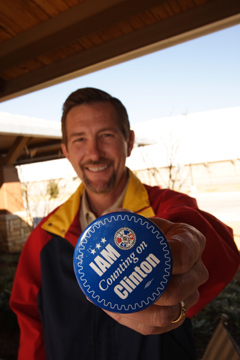 “Tarrant County is Hillary country,” said Jason Smith, a lawyer in Brender’s office. “She has long-time ties to the county and has even greater support because she saved the V-22 contract at Bell [Helicopter].” Danny Cook, a top official of the political action committee for the International Association of Machinists here, said his 4,000-member union overwhelmingly endorsed Clinton in online voting in September. “This is the first time this was done by the members themselves and not their representatives,” the Lockheed worker said. In Tarrant County, “Machinists can get out the vote,” he said. “We did it for Dan Barrett [a Democrat who won the Texas House seat vacated by Republican Anna Mowery], and we take partial credit for his victory.”
“Tarrant County is Hillary country,” said Jason Smith, a lawyer in Brender’s office. “She has long-time ties to the county and has even greater support because she saved the V-22 contract at Bell [Helicopter].” Danny Cook, a top official of the political action committee for the International Association of Machinists here, said his 4,000-member union overwhelmingly endorsed Clinton in online voting in September. “This is the first time this was done by the members themselves and not their representatives,” the Lockheed worker said. In Tarrant County, “Machinists can get out the vote,” he said. “We did it for Dan Barrett [a Democrat who won the Texas House seat vacated by Republican Anna Mowery], and we take partial credit for his victory.”
While Texas Democrats are putting on their running shoes and getting out the party hats, their Republican counterparts are folding their arms and thinking about maybe taking a vacation in early March. Unless they decide to stay and play on the Democrats’ side of the fence, of course. In Texas, voters can participate in either party’s primary, as long as they don’t try to cast ballots in both (and they can’t then switch parties for runoffs). It’s not as if Republicans don’t have their own favorite in the Dems’ race. They do – and it’s decidedly Hillary. Hollern said that, except for the enthusiasm among a handful of evangelicals here for Huckabee’s die-hard candidacy, there is little enthusiasm among local Republicans about the primary. McCain just ain’t their guy. “Among party activists [here] he’s not conservative enough. And the primary voters are always more conservative than those who vote in the general election,” Hollern said. Plus, the fact that the Republican candidates who have dropped out will still be on the ballot could muddy the waters more. Some may go ahead and vote for their favorite simply because they can’t stand McCain, he said, but “most, I fear, will just stay home.”
Even though he has the nomination almost sewn up, McCain has to come to Texas, one Republican leader said.
“If Huckabee drops out, the grassroots are still going to have to see how McCain reacts to them,” said Hans Klingler, communications and political director for the Texas Republican Party. “That’s always been one of John’s problems, that we’ve never seen that here in Texas. He’s going to have to come to Texas and work it. He can’t count on surrogates to do that. “I think there’ll be pressure on him to do that,” Klingler said. “And I think he will do that. It’s in his nature.” All the Republicans interviewed for this story said they are praying that the Democratic nominee will be Clinton. “With all her negatives, she will be the easiest for any Republican to beat,” Deckert said.
Republicans aren’t the only ones figuring that Clinton’s nomination could hurt the Democratic cause. Some local Democratic officials said they’re worried about the same thing. There is so much vehement opposition to Hillary Clinton among Republicans that having her on the ballot in November could potentially sink a Democratic revival in Texas, Greene and Burnam said. If Clinton is at the top of the ballot in the general election, Greene said, “It will be the death knell for our down-ballot candidates” who have Republican opponents. “The party’s split here, no question,” Burnam said. “Clinton is so disliked by Republicans here, who are still in the majority and who tend to vote a straight ticket, that they will pour out in droves to vote against her. She doesn’t even have support among independents here.”
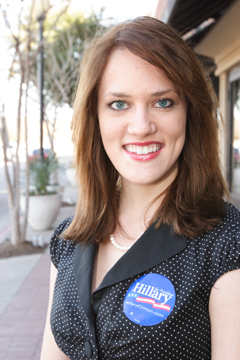 And that could mean that two area House seats recently won by Democrats could go down the tube, Burnam said: Paula Hightower of Arlington, who upset long-time Republican legislator Toby Goodman in the last election cycle, and newly elected Dan Barrett. Both are unopposed in the primary but will have Republican opponents in the fall. “We have to hang on to those seats if we are ever going to get the statehouse back,” Burnam said. Clinton supporter Smith said that such concerns “shouldn’t be an issue [within the party.] We need to stop worrying about the crazy right-wing Republicans and choose the best-qualified candidate to win the election, and that’s Hillary.” Besides, he said, “Obama’s negatives with Republicans will be just as high as hers once he’s subjected to the same [right-wing] scrutiny, and he will be, make no mistake about it.”
And that could mean that two area House seats recently won by Democrats could go down the tube, Burnam said: Paula Hightower of Arlington, who upset long-time Republican legislator Toby Goodman in the last election cycle, and newly elected Dan Barrett. Both are unopposed in the primary but will have Republican opponents in the fall. “We have to hang on to those seats if we are ever going to get the statehouse back,” Burnam said. Clinton supporter Smith said that such concerns “shouldn’t be an issue [within the party.] We need to stop worrying about the crazy right-wing Republicans and choose the best-qualified candidate to win the election, and that’s Hillary.” Besides, he said, “Obama’s negatives with Republicans will be just as high as hers once he’s subjected to the same [right-wing] scrutiny, and he will be, make no mistake about it.”
Regardless of who wins the primary, Democratic leaders obviously are hoping that the ranks of new and re-energized voters who turn out for their primary – Hispanics, young voters, internet-inspired voters, union members, independents and former black Republicans coming to vote for Obama – will help change their party’s fortunes in Texas. (With help, of course, from an unpopular war, an unpopular Republican president, a sinking economy, the cutbacks in civil liberties and a scandal-ridden administration.) People who come out mostly to vote for, say, Obama might remember those other Democratic names on the ballot come November – or maybe even vote a straight Democratic ticket. “For those who follow politics and enjoy politics, it’s Christmas on March 4,” said Watson, the Austin state senator. “I think you’re going to see people voting in this primary that maybe haven’t voted in Democratic primaries in their life.”
So get ready to have your hand shaken and your vote asked for. “The candidates will be coming in sooner rather than later and a lot of their surrogates too,” said Hector Nieto, spokesman for the Texas Democratic Party. “You’ll see them across the state. There’ll be get-out-the-vote campaigns for both sides [Clinton and Obama].” Texans will even get interviewed by the media horde that will arrive with the candidates. At least for a little while, it will be like living in Iowa – some place where your vote really counts.
You can reach Dave McNeely at
dmcneely@austin.rr.com.
You can reach Betty Brink at
bettybrink@att.net.











